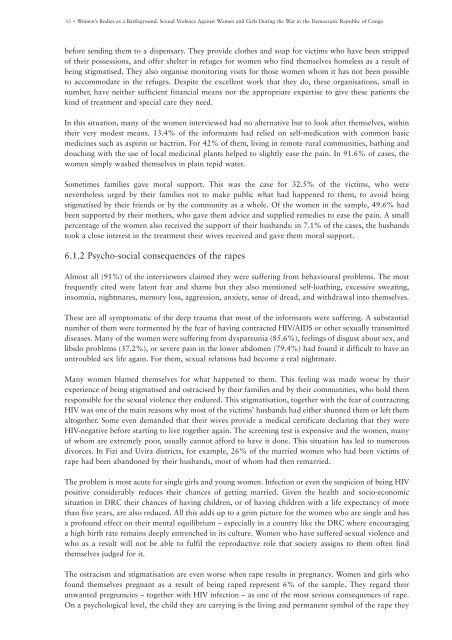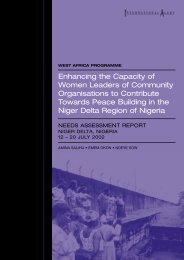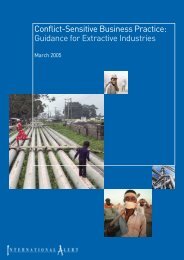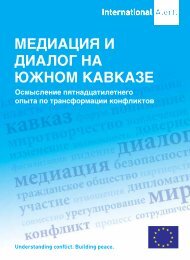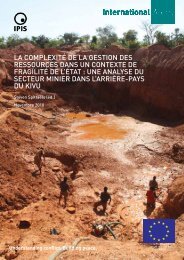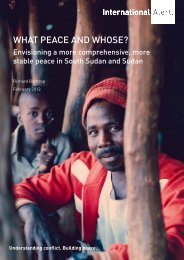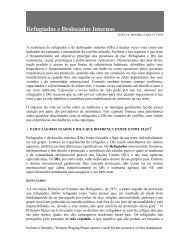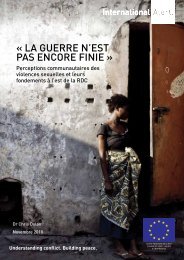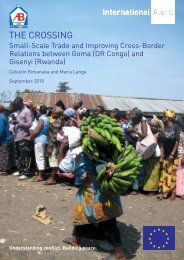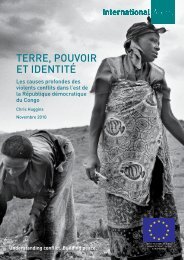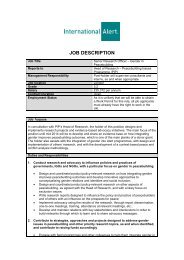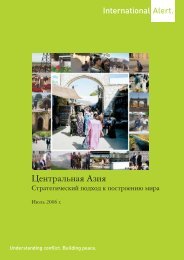Full report - International Alert
Full report - International Alert
Full report - International Alert
- No tags were found...
Create successful ePaper yourself
Turn your PDF publications into a flip-book with our unique Google optimized e-Paper software.
42 • Women’s Bodies as a Battleground: Sexual Violence Against Women and Girls During the War in the Democratic Republic of Congobefore sending them to a dispensary. They provide clothes and soap for victims who have been strippedof their possessions, and offer shelter in refuges for women who find themselves homeless as a result ofbeing stigmatised. They also organise monitoring visits for those women whom it has not been possibleto accommodate in the refuges. Despite the excellent work that they do, these organisations, small innumber, have neither sufficient financial means nor the appropriate expertise to give these patients thekind of treatment and special care they need.In this situation, many of the women interviewed had no alternative but to look after themselves, withintheir very modest means. 13.4% of the informants had relied on self-medication with common basicmedicines such as aspirin or bactrim. For 42% of them, living in remote rural communities, bathing anddouching with the use of local medicinal plants helped to slightly ease the pain. In 91.6% of cases, thewomen simply washed themselves in plain tepid water.Sometimes families gave moral support. This was the case for 32.5% of the victims, who werenevertheless urged by their families not to make public what had happened to them, to avoid beingstigmatised by their friends or by the community as a whole. Of the women in the sample, 49.6% hadbeen supported by their mothers, who gave them advice and supplied remedies to ease the pain. A smallpercentage of the women also received the support of their husbands: in 7.1% of the cases, the husbandstook a close interest in the treatment their wives received and gave them moral support.6.1.2 Psycho-social consequences of the rapesAlmost all (91%) of the interviewees claimed they were suffering from behavioural problems. The mostfrequently cited were latent fear and shame but they also mentioned self-loathing, excessive sweating,insomnia, nightmares, memory loss, aggression, anxiety, sense of dread, and withdrawal into themselves.These are all symptomatic of the deep trauma that most of the informants were suffering. A substantialnumber of them were tormented by the fear of having contracted HIV/AIDS or other sexually transmitteddiseases. Many of the women were suffering from dyspareunia (85.6%), feelings of disgust about sex, andlibido problems (37.2%), or severe pain in the lower abdomen (79.4%) had found it difficult to have anuntroubled sex life again. For them, sexual relations had become a real nightmare.Many women blamed themselves for what happened to them. This feeling was made worse by theirexperience of being stigmatised and ostracised by their families and by their communities, who hold themresponsible for the sexual violence they endured. This stigmatisation, together with the fear of contractingHIV was one of the main reasons why most of the victims’ husbands had either shunned them or left themaltogether. Some even demanded that their wives provide a medical certificate declaring that they wereHIV-negative before starting to live together again. The screening test is expensive and the women, manyof whom are extremely poor, usually cannot afford to have it done. This situation has led to numerousdivorces. In Fizi and Uvira districts, for example, 26% of the married women who had been victims ofrape had been abandoned by their husbands, most of whom had then remarried.The problem is most acute for single girls and young women. Infection or even the suspicion of being HIVpositive considerably reduces their chances of getting married. Given the health and socio-economicsituation in DRC their chances of having children, or of having children with a life expectancy of morethan five years, are also reduced. All this adds up to a grim picture for the women who are single and hasa profound effect on their mental equilibrium – especially in a country like the DRC where encouraginga high birth rate remains deeply entrenched in its culture. Women who have suffered sexual violence andwho as a result will not be able to fulfil the reproductive role that society assigns to them often findthemselves judged for it.The ostracism and stigmatisation are even worse when rape results in pregnancy. Women and girls whofound themselves pregnant as a result of being raped represent 6% of the sample. They regard theirunwanted pregnancies – together with HIV infection – as one of the most serious consequences of rape.On a psychological level, the child they are carrying is the living and permanent symbol of the rape they


